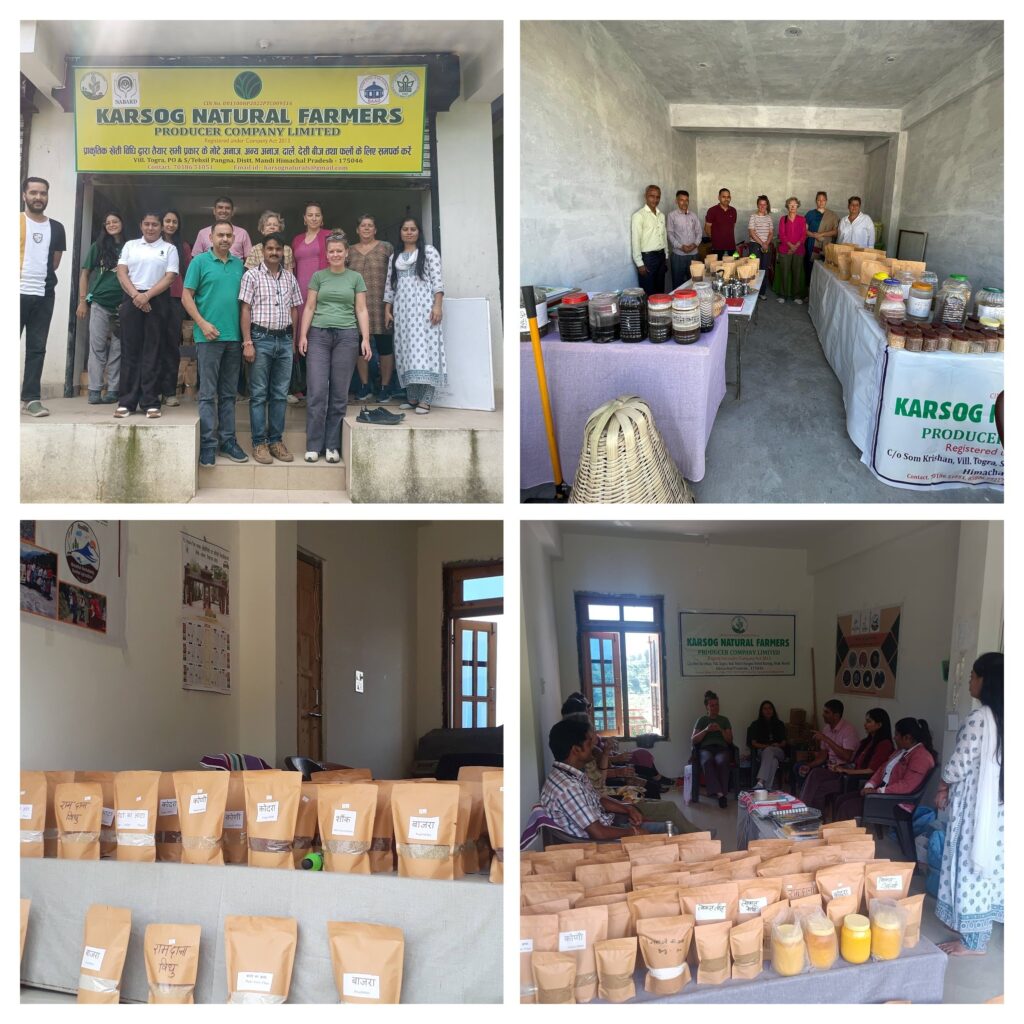Building Sustainable Food Systems Through Agroecology and Market Linkage
Nestled in Himachal Pradesh’s Karsog Valley, smallholder farmers are paving the way for sustainable agriculture. Here Gram Disha Trust (GDT) is building capacity of Smallholder run Karsog Naturals Farmer Producer Company (KNFPC). Over the last decade the trustees of GDT have been iterating with programs and innovations to create communities at inter- and intra-village level on Organic/Natural Farming, Value Chains, Market Linkage and Research. The core focus remains empowering rural youth and Sustainability of the Himalayan Agri-Food System.
Facing challenges such as limited market access and a need for stable income, these farmers are transforming traditional agricultural practices into models of resilience and self-sufficiency. With the support of GDT and institutions like NABARD and UHF Nauni, KNFPC is empowering local farmers to adopt natural farming practices methods and connect their produce to regional and national markets. Through the establishment of multiple retail outlets across the valley and the implementation of the CETARA-NF certification system amongst all the members of FPC, KNFPC ensures that sustainable practices are both visible and valuable to consumers.
Linking Global Agroecology Goals (ACROPICS) to Local Impact
This work aligns with the goals of the ACROPICS project, an international alliance aimed at advancing Sustainable Agroecological Systems (SAS) through innovative crop protection and reduced reliance on harmful inputs. ACROPICS brings together global research organizations to foster sustainable farming practices, with Gram Disha Trust (one of the 13 SAS) participating as key partner in India. As part of ACROPICS, the grant provided to KNFPC supports its transformation into a model for agroecological practices in the Himalayas. By promoting indigenous crops and using NF (Natural-Farming) methods to cultivate the crop, whereas side by side honing skills like market linkages and business tools, the grant enables KNFPC to contribute to ACROPICS’ larger vision of creating a sustainable food systems that can inspire similar initiatives across the globe.

KNFPC Board of Directors approached GDT to support with rural market linkage in the geography of the smallholders. The FPC was open to operationalise these market points but was challenged for availability of seed funds for their opening and functioning. GDT agreed to support the FPC with small grants as formative steps to ensure 3 outlets and a model farm be developed for the purpose. In this article, we share the Grant Making results for KNFPC, the challenges identified and mitigation methods. KNFPC is welcome to execute and reapply for such Grants should the need arise. Ultimately it is the goal of all programs of GDT that the farmers and such institutions must be the prime drivers of resilience and self-sufficiency since Grant Funding shall always remain limited and challenging in availabilty.
A Report made by GDT for their Expenditure & Sales
The recent Grant Utilization Report sheds light on how the funding has enabled KNFPC to address key challenges in marketing, inventory management, and distribution, specifically for crops like millets, fruits, and indigenous vegetables and seeds. With targeted support, these initiatives are establishing a local food network that reduces dependency on intermediaries, promotes fair pricing for farmers practicing natural farming, and strengthens farmer communities by connecting them directly with consumers.
Why Gram Disha Trust Chose to Support KNFPC?
GDT has supported with the grant KNFPC as part of its long-standing commitment to advancing the welfare of Himalayan farmers. Working closely with smallholder farmers in the region, GDT aims to empower these communities to build sustainable, resilient agricultural systems. KNFPC had reached out to GDT for grant assistance, for the establishment of its outlets, and to improve/enhance its marketing capacity and professionalise its operations. Specifically, the grant was intended to provide crucial training for both the smallholder farmers and the company’s leadership, including the CEO, enabling them to effectively manage KNFPC as a thriving business entity. Through this support, GDT seeks to strengthen KNFPC’s ability to establish secure, fair market linkages that benefit local farmers by minimising reliance on intermediaries and boosting profit margins on their own for FPC. The grant’s focus on seed distribution, business training, market development, and promoting of indigenous crops aligns with GDT’s mission to equip Himalayan farmers with the tools to become economically self-reliant. By supporting KNFPC in building these essential skills and systems, GDT is investing in a model of agricultural empowerment that has the potential to uplift communities across the region, paving the way for long-term growth in Himachal Pradesh. When the FPC would run smoothly, it would be a model by, for, and from farmers from the Himalayan ecosystem itself, motivating others around it. Additionally, KNFPC has committed to collaborating with GDT in its capacity as Sustainable Agricultural System (SAS) for ACROPICS on research aspects. Primarly on innovating with Value Chains and Market linkage as drivers for Agroecological Production and Food Systems Transformation.
A Report submitted by the KNFPC for their Expenditure & Sales May – Jul 2024
This blog explores the journey of KNFPC’s smallholder members, their achievements, and the strategies implemented to foster a thriving agroecological model that could be replicated across similar communities. By combining local knowledge with institutional support and innovation, this partnership is an example how sustainable food systems can be built from the ground up, creating impact for both the environment and rural livelihoods.

